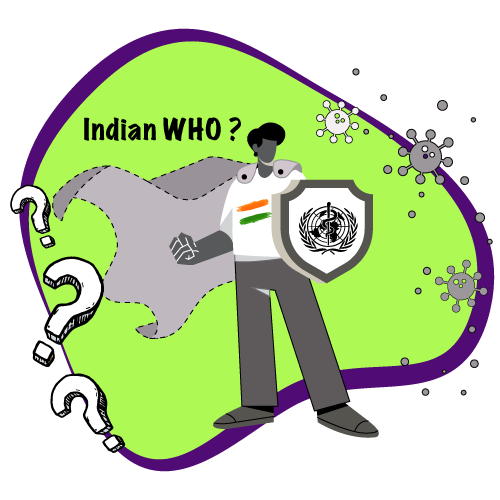Politics of the Pandemic – India’s Role

Introduction
It is obvious that the World Health Organization (hereinafter WHO) is currently under a microscope and being a specialized agency of the United Nations that is solely responsible for international public health, the Body is doing all that it can to keep the citizens of the world safe. But, this is not the only reason for it to be under a microscope. The WHO has announced that the Indian Union Health Minister, Dr. Harsh Vardhan is set to take charge as the chairman of the 34 elected-member Executive Board of the WHO from May 22, 2020. Dr. Harsh is currently the Union Cabinet Minister of India holding three portfolios i.e. Health and Family Welfare, Science and Technology and Earth Sciences. He has also served as an Advisor to the World Health Organization for many years and was a member of many international technical committees.
As this Board is an executive organ of the Health Assembly, the most important function of the board is to give effect to the decisions and policies, which is also an integral organ of the WHO.
Moreover, this board is entrusted with the work that provides advice and gives proposals to the Health Assembly on various initiatives and prepares the agenda for meetings. The Westerners have already shown their support and confidence in this appointment and are hoping that India will play a major role in depoliticizing the WHO.
Further, India seems to ensure that emergency measures are taken and financial resources of the Organization are in place to deal with events requiring immediate action.
Failure of WHO During Covid-19
The WHO has been in the centre of criticism for its role played during Covid-19 and this is not a fortnight issue. From The start of the outbreak back in the year 2019, to declaring it as a public health emergency in 2020, followed by the current health governance tussle; this organization has witnessed the strongest criticism for continuously favouring China and becoming a tool of the Chinese power. Further, it has been condemned for not being able to exercise global health leadership in its inability to take important measures to combat the corona-crisis .
Even after transforming and giving extraordinary powers to WHO in 2005 shaped by its failure in controlling ‘Severe Acute Respiratory Syndrome’ (SARS) in 2003, the WHO has failed yet again in battling the corona-outbreak.
The main allegations that have been framed against the WHO are:
- Violation of Article 9 of International Health Regulations (IHR) that allows WHO to act upon the non-state information sources and question member states on their decision-making.
- Failure to declare Coronavirus as a public health emergency of international concern in a timely manner and declaring it only when it became extremely severe.
- No action taken by WHO in regard to violation of Article 6 of the IHR by China that obligated their government to notify Corona-outbreak within 24 hours of assessing the events.
- Failure in protecting the human rights that were violated as consequences of harsh government responses, such as mandatory quarantine and isolation measures.
The propaganda of the Chinese Government and its political needs have overshadowed the WHO principle of being fair and impartial in keeping the citizens of the world safe. The corona-outbreak has uncovered the deficiencies that are pertaining to this state-driven multilateral organization that sacrifices its sovereignty to the whims and fancies of other nations.
Role Of India After its recent high level Appointment
The current appointment is celebrated by most of the nations as India has always taken a diplomatic stand in its foreign policy relations. With this current post, India can do its bit by making sure all developing and developed countries have the right access to drugs, diagnostics, and vaccines.
A balanced approach has to be adopted in which India could play a bridging role between developed and developing countries and focus more on institutional reforms ground up. This could be done by ensuring that all the countries get equitable representation irrespective of any discrimination so that they could present their grievances and be able in seeking financial relief.
The WHO lacks the postulate of a proactive “leader” and India can ensure in being one of them through its fair treatment and out-throwing inherited biasedness that has touched the roots of this agency. Working on issues that seek immediate attention should be the need of the hour.
Certainly, India’s nomination will also play an important role in the diplomatic relations between the U.S. and China that is currently mutilated and further aggravated by the U.S’s. demand of seeking a fair investigation against China for the Covid-19 outbreak.
More than 62 countries including India have agreed to a resolution demanding “impartial, independent and comprehensive” investigation into the WHO’s responses to the spread of COVID-19.
Conclusion
Undeniably, India holding this key position of being the Chairman of the Executive Board will help this nation to play a significant role in multi-nation politics; nonetheless, holding such a post will also check the diplomatic intelligence of India as a powerful sovereign nation.
The world is waiting to witness the hegemonic politics of this nation-state and is curious to see whether India will be able to stand firm against the rising Chinese diplomacy and its increasing economic hold;
or whether India will accede to Chinese pressure and retract its course of action and remain as a neutral spectator?
Besides the politics of pandemic, India through WHO has to find a safe health passage followed by a global corona exit plan so that the sabotaged world can recover in a staged manner so that there is not a second wave to this pandemic.

